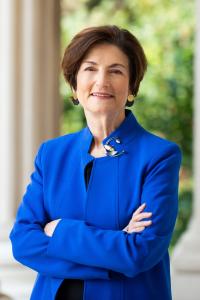
Experience Corps: A 30-Year Legacy of Intergenerational Impact
In 1995, Linda P. Fried and Marc Freedman launched a novel senior volunteer program called Experience Corps to create new, meaningful, and impactful volunteer roles for older adults in an aging society while also boosting their health.
To mark the 30th anniversary of what is now known as AARP Foundation Experience Corps, Fried, the former dean of Columbia Mailman School and current director of the Robert N. Butler Columbia Aging Center, and Freeman, founder and co-CEO of CoGenerate, led a panel discussion at the recent AARP Foundation meeting in Washington, D.C. The discussion, which also included John Gomperts, Executive Fellow for the Campaign for Grade Level Reading, touched on the program’s origins, its significant accomplishments over the years, and how it evolved with the support of AARP Foundation. Today, Experience Corps is active in 16 U.S. cities.
When they first envisioned Experience Corps, Fried and Freedman saw an untapped resource in older adults to support the academic success of children. The opportunity was huge. Early academic success is a strong predictor of success throughout life. At the same time, research has shown that one key to successful aging is having the chance to make a lasting contribution to society. (Read a related story about a new report from the Association of Schools and Programs of Public Health (ASPPH) Task Force on Healthy Longevity, chaired by Fried.)
Launched as a demonstration project of the Corporation for National and Community Service, Experience Corps was designed to produce a triple win: boost children’s academic success, promote healthy aging, and build social capital in an aging society. Since then, the program’s volunteer tutors have helped thousands of elementary students across America. Nearly all tutors reported that Experience Corps helped them stay physically and mentally active, and that it helped build their digital and workforce skills. Not least of all, it also made them feel better about themselves.
In 2004, when Experience Corps reported its first results, John Rowe, professor of Heath Policy and Management, co-authored an editorial in the Journal of Urban Health about the program, its goals, and its achievements, writing, “there were positive effects on students and teachers, and the program was cost-effective.”
“Experience Corps is a 21st Century public health program which should be part of the social infrastructure of every community,” says Fried, who is also a professor of epidemiology. The program enables “the unprecedented and positive social capital of older people to help solve the challenges we are confronted by, and to build their health and solve loneliness for the future,” she adds.
Photo by Greg Kahn courtesy of the AARP Foundation.
